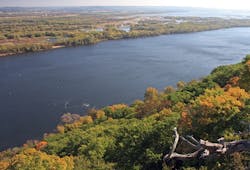USDA supports 73 projects to improve water quality in Mississippi River Basin
WASHINGTON — Nov. 3, 2015 — Agriculture Secretary Tom Vilsack announced new funding to help improve water quality in the Mississippi River Basin, according to a press release.
The U.S. Department of Agriculture‘s Natural Resources Conservation Service (NRCS) is investing $30 million this year in projects that will reduce loss of nutrients and sediment to waters that eventually flow into the Gulf of Mexico, stated the release.
The funding supports 33 new projects and 40 existing projects across the region as part of the Mississippi River Basin Healthy Watersheds Initiative, helping farmers adopt conservation systems to improve water quality, enhance wildlife habitat and restore wetlands, noted the release.
For example in Wisconsin, NRCS will work with Crawford and Vernon County Land Conservation Departments and others to help landowners and producers in the Kickapoo River watershed address nutrient and sediment losses from cropland and degraded pastures, reported the release.
At Upper Birds Point in Missouri, NRCS will work with Mississippi County Soil and Water Conservation District and others to target high vulnerability cropland and implement practices to reduce sediment and nutrient loss, improve migratory bird habitat and protect shallow groundwater.
In Arkansas, NRCS will work with Desha County Conservation District and others to implement water quality practices on over a third of high-priority acres to significantly reduce nutrient and sediment loading to Upper Bayou Macon and improve habitat for four threatened and endangered aquatic species.
And in a project in Slocum Creek, Iowa, NRCS will work with the East Pottawattamie Soil and Water Conservation District, the City of Oakland, and the Iowa Department of Agriculture and Land Stewardship, among others, to identify and treat high priority acres in the watershed in order to reduce nutrient loss and improve water quality.
“By targeting small, priority watersheds within the Mississippi River basin, we are helping to deliver local water quality benefits and contributing to large-scale improvements for the Basin as a whole,” Vilsack commented in the release. “Water quality is important to everyone, at all levels of government, to private landowners, and in rural and urban areas alike. The many partnerships created through this initiative are both impressive and promising to the future of these watersheds.”
You can find the entire release here.
